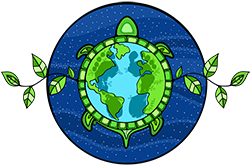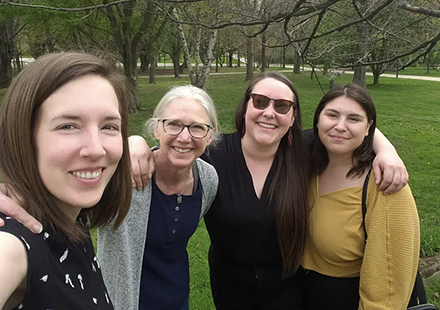Connecting for Climate Change Action
Take online for free
Please sign up for our email list below to receive information about our Fall 2025 course!
JOIN OUR EMAIL LIST
About the Course
Recent climate warming is the result of human activities, including fossil fuel burning and land clearance, which have increased the concentration of CO2 in our atmosphere to levels not seen in over 800,000 years. Climate change is here now as evidenced by news headlines about unprecedented drought and flooding, extreme heat and wildfires. It is the defining challenge of our times. What can we do about it?

Connecting for Climate Change Action is a course that uses a storytelling approach to bring Western and Indigenous Sciences together to educate, encourage discussions, and motivate action on climate change. This innovative, experiential, online learning opportunity engages and stimulates learners to action to mitigate climate change.
Climate change is everybody’s business, which is why we are inviting you to join in our course to find ways to engage and take action. Improve your climate change literacy, examine systemic inequities, and promote discussion and action for people from all walks of life.
Join Us for 8 Modules
- Welcome and Getting Started (1 week)
- Ways of Knowing that Climate is Changing (1 week)
- The Earth, Climate and Connections (2 weeks)
- Why is the Earth’s Climate Changing? (2 weeks)
- Emissions, Responsibility and Reimagining Economies (2 weeks)
- Climate Pathways from Data and Experience (2 weeks)
- Exploring Climate Action (2 weeks)
- Connecting for Climate Change Action (1 week)
Open Course Format
Delivery: Online
Audience: Adult learners
Commitment: 12 weeks, 2-3 hours per week
Offerings: Each year, the course runs Jan - Apr, May - July, Sept - Dec.
Each module includes:
- Videos
- Readings
- Activities and interactives
- A reflection or discussion and a quiz
Your Course Instructors

Photo credit: Beth Hundey
Beth Hundey, Katrina Eyvindson, Sara Mai Chitty, Serena Mendizábal (left to right).
Meet Beth Hundey, Katrina Eyvindson, Sara Mai Chitty, and Serena Mendizábal, pictured here standing on Western University’s campus near the banks of Deshkan Ziibiing (Thames River, London, Ontario). They created this course as a team, with a shared vision for climate change education, and a collective urgency to bring people of all identities and spheres of influence together to envision and achieve a good climate future. They see the momentum and community that they have built to be the foundation for the kind of action they hope to see occur with learners. Individuals who care learn to speak up, they find momentum in the communities they create and join, and these communities can snowball into the systems change we so desperately need to ensure a good climate future.
Sara Mai Chitty
Sara Mai Chitty is a storyteller and educator, Michi Sagig Anishinaabekwe, and a member of Alderville First Nation. Sara Mai is a Curriculum and Pedagogy Advisor at the Office of Indigenous Initiatives, and a subject matter and pedagogical expert for Connecting for Climate Change Action.
Beth Hundey
Dr. Beth Hundey is a settler to Southwestern Ontario and an ally. She is a Curriculum Specialist and an Assistant Professor in Geography & Environment. Beth has expertise as an environmental change researcher and is a specialist in online education. Beth is committed to bringing together diverse voices for climate justice and action, and in helping learners explore climate data that is meaningful to them.
Serena Mendizábal
Serena is a Cayuga Panamanian Wolf clan woman from the Six Nations of the Grand River Territory with a Masters of Geography and Environment at Western University. Serena is a community-based researcher and community organizer driven by Indigenous governance and just clean energy futures.
Katrina Eyvindson
Dr. Katrina Eyvindson is a settler to Turtle Island and an ally. She is a professor in Geography & Environment whose research focuses on climate and environmental change. She is privileged and excited to be part of an amazing team of educators developing a course that draws on Western & Indigenous sciences to provide a framework to address climate change.
Our Team
The course involves 14 other team members and dozens of generous interviewees who bring their gifts to this learning experience. This team effort has been recognized in institutional and national awards, and we want to acknowledge the members of Western’s Centre for Teaching and Learning, students and staff at Instructional Technology Resource Centre, and artist Hawlii Pichette for using their gifts and creativity to bring this course to life.
Help Spread the Word about C4CCA!
In the folder below, find social media posts and a printable poster you can use to help spread the word about your experience with Connecting for Climate Change Action!
Presented by:
Opportunities to help improve climate change education
Open Course Participants
Consider encouraging friends, family, co-workers, or community members to take part in the open course Connecting for Climate Change Action with you. Check in with each other on progress! Meet up (like a course club instead of a book club) and discuss what you’ve learned or even take action together! Consider sending us questions that have fostered good conversations that we can share with others, or share pictures of your events using the hashtag #C4CCA.
Post-secondary instructors
We started this work in part because we believe that every discipline and sector has a role to play in climate change action, but climate change action is still limited not included enough in educational settings. We want to do our part to help instructors in a variety of disciplines to bring climate change into the classroom. Ontario post-secondary instructors can access some of our materials through the eCampus Ontario Library.
High school teachers
Coming soon! We have run PD sessions about teaching Climate Change in science and geography classes, and are looking to make this information more widely available. Stay tuned!
Supported by:
- Western University
- Faculty of Social Science, Western University
- eCampusOntario
- ITRC (Instructional Technology Resource Centre), Western University
- Centre for Teaching and Learning, Western University


